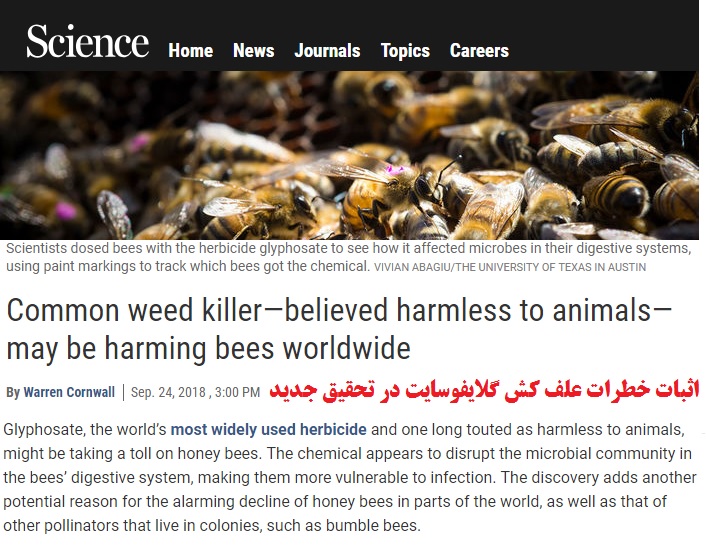ساخت کمپانی مافیایی صهیونیستی تراریخته مونسانتو که بارها ثابت شده بود مضر است ولی توسط طرفداران تراریخته رد می شد این بار در این تحقیق ثابت شده که مقادیر اندک این علف کش سبب بیماری زنبورهای عسل شده و با نابود کردن میکروبیوم ( میکرب های مفید دستگاه گوارش زنبور) سبب بیماری و مرگ آنها […]
ساخت کمپانی مافیایی صهیونیستی تراریخته مونسانتو که بارها ثابت شده بود مضر است ولی توسط طرفداران تراریخته رد می شد این بار در این تحقیق ثابت شده که مقادیر اندک این علف کش سبب بیماری زنبورهای عسل شده و با نابود کردن میکروبیوم ( میکرب های مفید دستگاه گوارش زنبور) سبب بیماری و مرگ آنها می شود. حال زنبورداران متوجه شده اند چرا زنبورها بطور گسترده ای در حال مرگ هستند چون از مزارع کشاورزی تراریخته ای که در آنها از این علف کش استفاده می شود تغذیه می کنند. بنابر این دانشمندان معتقدند این علف کش بروی میکروبیوم سایر موجودات از جمله انسان اثر کرده و سبب بیماری و حتی سرطان می شود.
با توجه به اینکه هر روز اهمیت میکروبیوم طبیعی دستگاه گوارش انسان برای سیستم ایمنی و سلامت انسان مشخص بیشتر روشن می شود بنابر این می توان درک کرد چرا میزان بیماری ها اینقدر افزایش یافته است زیرا این علف در سطح گسترده ای در جهان استفاده می شود. باید با ممنوعیت این علف کش خطرناک و عدم کشت تراریخته ها جلو افزایش بیماری زنبورها و مردم را گرفت.
Glyphosate, the world’s most widely used herbicide and one long touted as harmless to animals, might be taking a toll on honey bees. The chemical appears to disrupt the microbial community in the bees’ digestive system, making them more vulnerable to infection. The discovery adds another potential reason for the alarming decline of honey bees in parts of the world, as well as that of other pollinators that live in colonies, such as bumble bees.
“This is really critical,” says Fred Gould, an entomologist at North Carolina State University in Raleigh who was not involved in the work. The study challenges the conventional wisdom that animals are immune to glyphosate because it targets a cellular mechanism particular to plants and some bacteria. “I was surprised.”
Glyphosate kills plants by blocking an enzyme they use to make several key amino acids, the building blocks of proteins. Animals don’t produce this enzyme, but it is used by some bacteria.
This sparked the interest of Nancy Moran, an evolutionary biologist at the University of Texas in Austin, who has spent a decade examining the gut microbiome—the population of bacteria that inhabit the intestines of animals—of honey bees (Apis mellifera). She and colleagues took approximately 2000 bees from a hive and fed some a sugar syrup and others syrup dosed with glyphosate at levels similar to those they might encounter in the environment while foraging for food. Three days after returning to the hive, the guts of glyphosate-fed bees had lower levels of a bacterium known as Snodgrassella alvi than those bees that were not exposed. Some of the results were confusing; bees that got the most glyphosate had a more normal looking microbiome after 3 days than those that had lower doses. Moran says it’s not clear whether that’s because more bees with the higher dose died, leaving behind ones that better withstood the herbicide.
In further tests, bees that consumed glyphosate had five times less of the bacterium. In a petri dish, most strains of S. alvi either slowed or stopped growing after a high dose of glyphosate.
This change in a bee’s microbial inhabitants appears to make it more vulnerable to lethal infections. In tests on several hundred bees, only 12% of insects fed glyphosate survived infection from Serratia marcescens—a bacterium widely found in trace amounts in beehives and bee guts that can cause infections by invading other parts of a bee’s body—compared with 47% not fed glyphosate.
It’s not clear why a glyphosate-disrupted microbiome would make the bees more susceptible to infection, Moran says. S. alvi lines part of the gut wall, and could create a protective barrier. It also secretes a chemical that could attack invading bacteria, she says.
The findings—reported today in the Proceedings of the National Academy of Sciences—add a new factor to a constellation of potential reasons for the decline of honey bees witnessed in recent years, says Gene Robinson, a honey bee geneticist at the University of Illinois in Urbana who was not involved with the study. In recent years, U.S. commercial beekeepers have seen almost a third of their hives fail during the winter, more than twice the historic rate. Researchers believe that pesticides, pathogens, parasites, and nutritional problems all play a role. A major strength of the new paper is that it points to a mechanism—the disruption of gut microbes—for how a pesticide could affect the bees, he says.
The discovery also raises questions about whether glyphosate is affecting the microbiome of other animals, including people. The role of microbes in the human gut has a lot of similarities to bee guts, Moran says. More research is needed; humans have different microbes in their guts, they have vastly larger bacterial populations and are likely exposed to much lower doses of glyphosate than are bees.
The new research is certain to make a controversial herbicide even more of a flashpoint. Some have also warned it could sicken people. Public health agencies have offered conflicting assessments of whether the chemical is a likely carcinogen.
کد مطلب : A97070807



Monday, 23 December , 2024